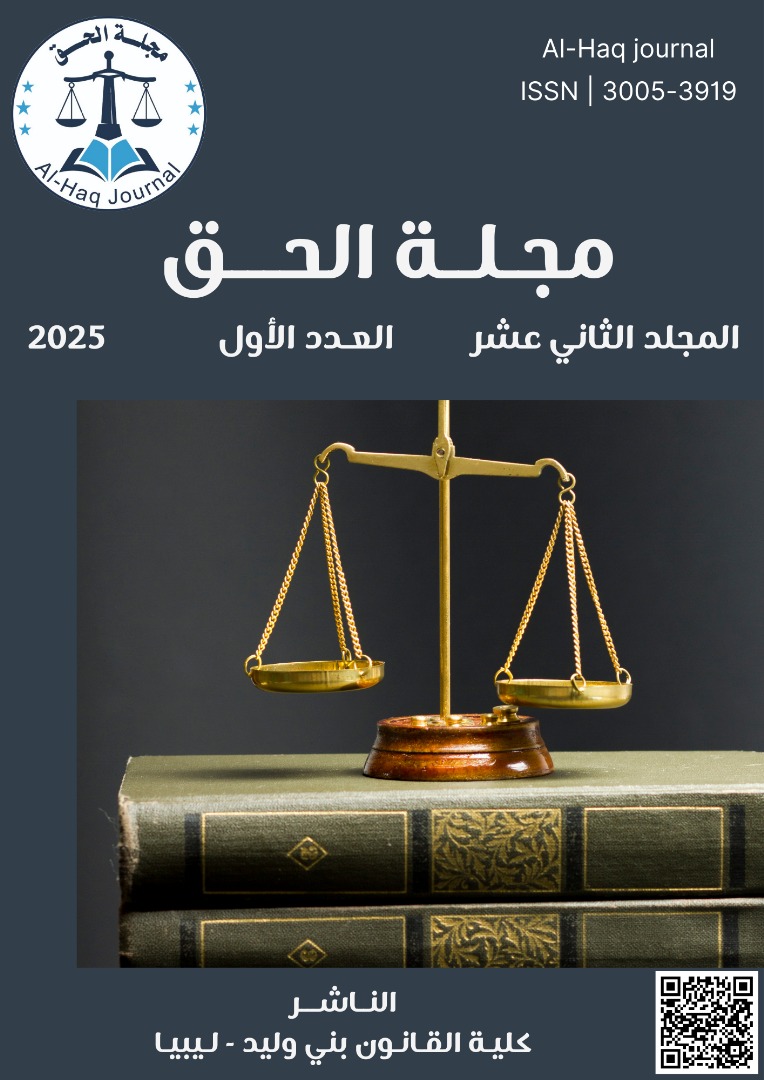Civil Bankruptcy Procedure Highlights of Law 17/1992 Regulating the Status of Minors and Those in Their Care
DOI:
https://doi.org/10.58916/alhaq.v12i1.279Keywords:
Civil bankruptcy, guardianship of the bankrupt debtor, judge, Law No. 17 of 1992 regulating the affairs of minors and those in their position, termination of guardianship of the bankrupt debtor.Abstract
Bankruptcy is considered one of the reasons for legal incapacitation and comes in various forms, including civil bankruptcy, which applies to civil matters. The Libyan legislator has indirectly and erroneously adopted this concept under a different term: the debtor's assets being encumbered by debt. Civil bankruptcy requires an understanding of its procedures, including the necessary conditions for the court to consider and exercise its jurisdiction over the matter. If a debtor is declared bankrupt, this has multiple implications—some benefiting the creditor and others benefiting the bankrupt debtor.
The researcher has employed an analytical approach, incorporating the perspectives of Islamic jurisprudence due to its richness and foundational contributions to this topic. Additionally, the study is primarily based on Law No. (17/1992) concerning the regulation of minors' affairs and those in similar situations, with reference to the stance of other legal systems.
This study aims to assess the extent of legislative attention given to the procedural framework of civil bankruptcy in Libyan law.
Key Findings:
- The Libyan legislator, in Law No. (17/1992) on the regulation of minors' affairs and similar cases, has not established conditions for declaring a debtor bankrupt, nor has it specified the competent court and its powers in such cases.
- There is a lack of legislative policy in Libyan law regarding the regulation of the consequences of civil bankruptcy, whether for the benefit of the creditor or the bankrupt debtor.
Downloads
References
First: Linguistic Dictionaries
- Ibn Manzur Abu al-Fadl Jamal al-Din Muhammad ibn Makram - Lisan al-Arab - Beirut, Dar al-Kutub al-Ilmiyyah - First Edition - Parts Two and Four - 1993
Second: Islamic Jurisprudence Books
- The Maliki School
- Al-Dardir Ahmad, Al-Sharh al-Saghir, Beirut, Dar al-Madar al-Islami, First Edition, Part Three, 2002
- Al-Sawi Ahmad, Balaght al-Salik li-Aqrab al-Masalik ila Madhhab al-Imam Malik, Beirut, Dar al-Madar al-Islami, First Edition, Part Three, 2002
- Sheikh al-Kharashi on Mukhtasar Sidi Khalil, no place of publication, Dar al-Fikr Printing House, no edition, Part Five, no year of publication
- Masoud, A. S., & Ateeq, E. A. (2022). Formalities in a Civil Lawsuit and the Penalty Arising from its Violation. Al-haq Journal for Sharia and Legal Sciences, 116-144.
- Sheikh al-Dasuqi Shams al-Din Muhammad Arafa, Al-Sharh al-Kabir, no place of publication, Dar Ihya al-Kutub al-Arabiyyah, no edition, Part Three, no year of publication
- Ali, A. S. M. (2019). Provisions regulating trademarks in international agreements. Al-haq Journal for Sharia and Legal Sciences, 57-83.
- Sheikh Al-Qarafi Shihab al-Din, Al-Dhakira fi Mahasin Ahl al-Jazira, Beirut, Dar al-Gharb al-Islami, edited by Muhammad Haji, first edition, Part Eight, 1994.
- Sheikh Alish Muhammad, Sharh Manh al-Jalil ala Mukhtasar al-Allamah Khalil, no place of publication, Dar Sadir, no edition, Part Three, no year of publication.
- Dr. Abd al-Rahman Ali Abd al-Aal, The Position of Sharia Regarding the Wealth of the Bankrupt, no place of publication, Dar al-Huda Printing House, 1988.
- The Hanafi School
- Al-Sarakhsi Shams al-Din, Al-Mabsut, Beirut, Dar al-Ma'rifa, compiled by Khalil al-Mays, no edition, Volume Twelve, no year of publication.
- Bin Nujaym Zayn al-Din, Al-Bahr al-Ra'iq Sharh Kanz al-Daqa'iq, Cairo, Dar al-Kitab al-Islami, second edition, Volume Eight, no year of publication.
- Bin Abd al-Wahid Kamal al-Din Muhammad, Sharh Fath al-Qadir, Beirut, Dar al-Kutub al-Ilmiyyah, no edition, Part Eight, no year of publication.
- The Shafi'i School
- Al-Shirazi Abu Ishaq Ibrahim, Al-Muhadhdhab fi Fiqh al-Imam al-Shafi'i, Beirut, Dar al-Ma'rifah, edited by Adel Abdul Mawjoud and Ali Awad, first edition, part two, 2003.
- Al-Shafi'i al-Ansari Shams al-Din Muhammad, Nihayat al-Muhtaj ila Sharh al-Minhaj, Beirut, Arab History Foundation, third edition, part four, 1992.
- The Hanbali School
- Al-Bahuti Mansur ibn Yunus, Kashf al-Qina' ala Matn al-Imta', Beirut, Dar al-Fikr for Printing, Publishing, and Distribution, reviewed and commented on by Sheikh Hilal Musalhi Hilal, no edition, third volume, 1982.
- Al-Maqdisi Muwaffaq al-Din Abu Qudamah and Shams al-Din ibn Qudama, Al-Mughni, no place of publication, Dar al-Kitab al-Masriya, no edition, part four, no year of publication.
Third: Legal Books
- Al-Rahou Hassan Ali Al-Danoun and Muhammad Saeed, A Concise Introduction to the General Theory of Obligations, Amman, Wael Publishing and Distribution House, First Edition, Part Two, 2004.
- Al-Sanhouri Abdul Razzaq Ahmad, Al-Wasit in Explaining the New Civil Law, Beirut, Al-Halabi Legal Publications, Third Edition, Part Two, 1998.
- By the same author, Sources of Rights in Islamic Jurisprudence, Cairo, Dar Al-Nahda Al-Arabiya, no edition, Part Five, no year of publication.
- Al-Zaini Ali, Principles of Commercial Law, Cairo, Al-Nahda Al-Masryia Library, Second Edition, Part Three, 1946.
- Abdullah Omar Al-Sayyid Ahmad, Means That Guarantee Creditors the Implementation of the Debtor's Obligations in the UAE Civil Transactions Law, Cairo, Dar Al-Nahda Al-Arabiya, no edition, 1995.
Downloads
Published
Issue
Section
License

This work is licensed under a Creative Commons Attribution-NonCommercial 4.0 International License.









